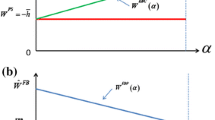Abstract
We examine a setting in which property rights are initially ambiguously defined. Whether the parties go to court to remove the ambiguity or bargain and settle before or after trial, they incur enforcement costs. When the parties bargain, a version of the Coase theorem holds. However, despite the additional costs of going to court, other ex-post inefficiencies, and the absence of incomplete information, going to court may ex-ante Pareto dominate settling out of court. This is especially true in dynamic settings, where obtaining a court decision today saves on future enforcement costs. When the parties do not negotiate and go to court, a simple rule for the initial ambiguous assignment of property rights maximizes net surplus.
Similar content being viewed by others
References
Anbarci N., Skaperdas S., Syropoulos C. (2002) Comparing bargaining solutions in the shadow of conflict: how norms against threats can have real effects. J Econ Theory 106: 1–16
Anderlini L., Felli L. (2006) Transaction costs and the robustness of the coase theorem. Econ J 116: 223–245
Becker G., Stigler G. (1974) Law enforcement, malfeasance, and compensation of enforcers. J Legal Stud 3: 1–18
Benson, B.: The Enterprise of Law: Justice Without the State. San Francisco: Pacific Research Institute for Public Policy (1990)
Bernardo A., Talley E., Welch I. (2000) A theory of legal presumptions. J Law Econ Organ 16: 1–49
Binmore K., Rubinstein A., Wolinsky A. (1986) The Nash bargaining solution in economic modeling. Rand J Econ 17: 176–188
Buchanan J. (1989) Notes on irrelevant externalities, enforcement costs, and the atrophy of property rights. In: Tollison R., Vanberg V. (eds). Explorations into Constitutional Economics. College Station, Texas A&M University Press
Chipman, J.: A close look at the Coase theorem. In: Buchanan, J., Monissen, B. (eds.) The Economist’s Vision: Essays in Modern Economic Perspectives; for Hans G. Monissen on the Occasion of His 60th Birthday. Frankfurt am Main: Campus Verlag (1998)
Clark D., Riis C. (1998) Contest success functions: an extension. Econ Theory 11: 201–204
Coase R. (1960) The problem of social cost. J Law Econ 3:1–44
Coase R. (1992) The institutional structure of production. Am Econ Rev 82: 713–719
Cooter R., Rubinfeld D. (1989) The economic analysis of legal disputes and their resolution. J Econ Lit 27: 1067–97
Cornes R., Hartley R. (2005) Asymmetric contests with general technologies. Econ Theory 26: 923–946
Demsetz H. (1972) When does the rule of liability matter?. J Legal Stud 1: 13–28
Farmer A., Pecorino P. (1999) Legal expenditure as a rent seeking game. Public Choice 100: 271–288
Farnsworth W. (1999) Do parties in nuisance cases bargain after judgment?. A glimpse inside the cathedral. Univ Chic Law Rev 66: 373–436
Farrell J. (1987) Information and the Coase theorem. J Econ Perspect 1: 113–129
Garfinkel M., Skaperdas S. (2000) Conflict without misperceptions or incomplete information. J Conflict Resolut 44: 793–807
Glazer A., Konrad K. (1999) Taxation of rent-seeking activities. J Public Econ 72: 61–72
Grossman S., Hart O. (1986) The costs and benefits of ownership: a theory of vertical and lateral integration. J Polit Econ 84: 691–719
Hart O. (1995) Firms, Contracts, and Financial Structure. Oxford, Clarendon Press
Hay B., Spier K. (1998) Settlement of litigation. In: Newman P. (eds). The New Palgrave Dictionary of Economics and the Law. New York, Stockton Press, pp. 1–2
Hirshleifer J. (2001) The Dark Side of the Force. New York, Cambridge University Press
Hirshleifer J., Osborne E. (2001) Truth, effort and the legal battle. Public Choice 108: 169–195
Hurwicz L. (1995) What is the Coase theorem?. Jpn World Econ 7:49–74
Katz A. (1988) Judicial decisionmaking and litigation expenditure. Int Rev Law Econ 8: 127–143
Luce D. (1959) Individual Choice Behavior: A Theoretical Analysis. New York, Wiley
McKelvey R., Page T. (2000) An experimental study of the effect of private information in the Coase theorem. Exp Econ 3: 187–213
Myerson R., Satterthwaite M. (1983) Efficient mechanisms for bilateral trading. J Econ Theory 28: 265–281
Riddell W. (1981) Bargaining under uncertainty. Am Econ Rev 71:579–590
Schelling T. (1960) The Strategy of Conflict. Cambridge, Harvard University Press
Skaperdas S. (1996) Contest success functions. Econ Theory 7:283–290
Stigler G. (1970) The optimum enforcement of laws. J Polit Econ 78: 526–536
Ulen T. (1991) Flogging a dead pig: Professor Posin on the Coase theorem. Wayne Law Rev 38: 91–105
Usher D. (1998) The Coase theorem is tautological, incoherent or wrong. Econ Lett 61: 3–11
Varian, H.: Intermediate Microeconomics: A Modern Approach. 6th edn. New York: W.W. Norton (2003)
Author information
Authors and Affiliations
Corresponding author
Additional information
A paper circulated under the same title and dated 6 March 2000 contained the basic structure examined in this paper, but did not develop many of the results reported here. For comments, we would like to thank participants at the WZB-CEPR contests conference and seminar audiences at the University of Southern California, the University of British Columbia, UC Davis, and UC Riverside.
Rights and permissions
About this article
Cite this article
Robson, A., Skaperdas, S. Costly enforcement of property rights and the Coase theorem. Economic Theory 36, 109–128 (2008). https://doi.org/10.1007/s00199-007-0268-x
Received:
Revised:
Published:
Issue Date:
DOI: https://doi.org/10.1007/s00199-007-0268-x




